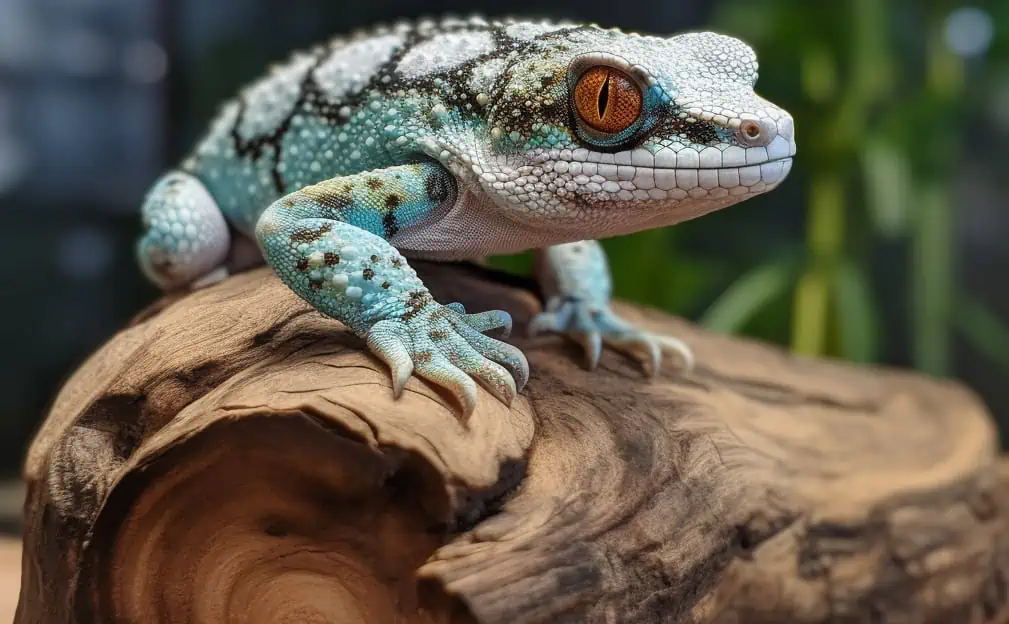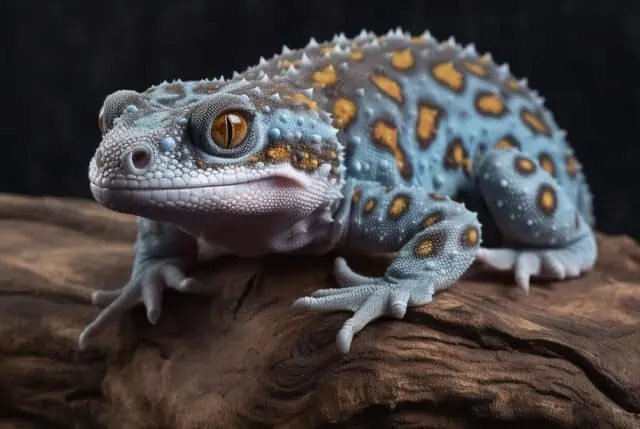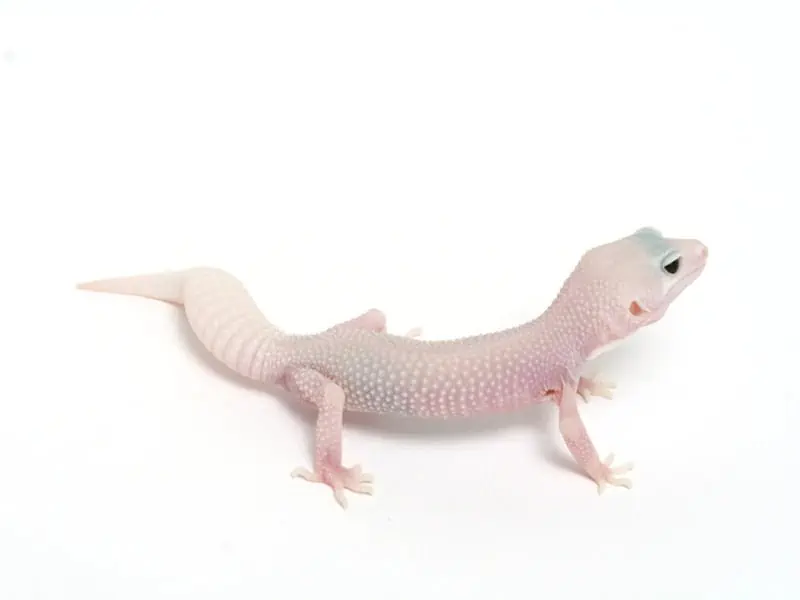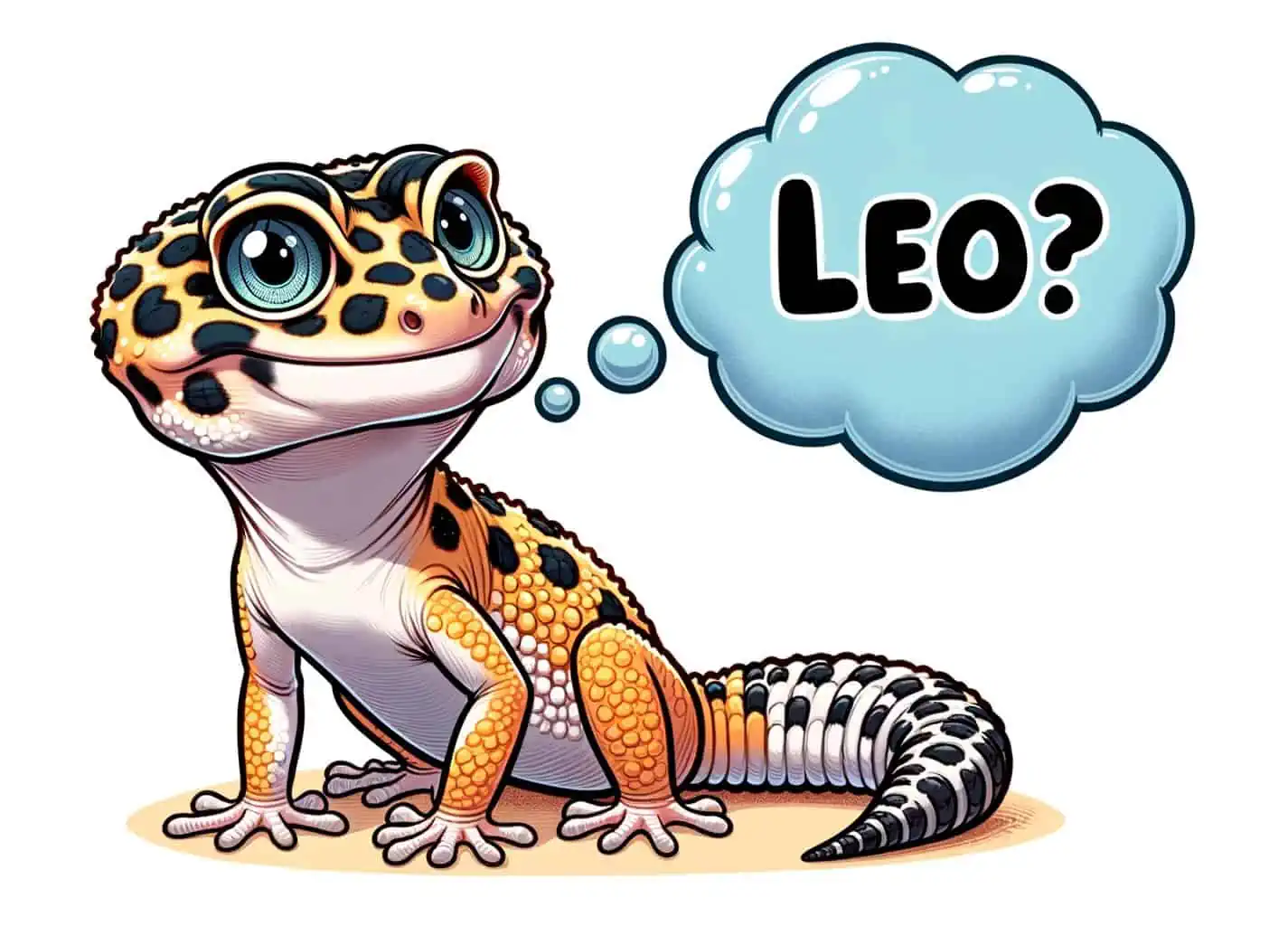When it comes to the captivating world of reptile pet care, Tokay Geckos bring their own unique flair with their brilliant colors and engaging behaviors. But just like any pet, they have specific needs that require careful attention. Among these, diet and feeding are pivotal to their overall health and well-being.
If overlooked, overfeeding can lead to obesity, a common yet severe issue in these little creatures. In this article, we will delve deep into the world of Tokay Geckos, helping you understand their dietary requirements, identify the signs of obesity, and guide you in managing and preventing this health concern effectively. So, let’s embark on this enlightening journey together!
Anatomy and Dietary Needs of Tokay Geckos
To effectively manage obesity and overfeeding in Tokay Geckos, a comprehensive understanding of their unique anatomy and dietary needs is essential. Originating from Southeast Asia, these geckos are among the largest of their kind, measuring between 7 to 15 inches in length, with the males being typically larger.
In the wild, Tokay Geckos are considered omnivores, consuming a varied diet that includes insects, small mammals, and even other lizards. In captivity, their diet is predominantly insect-based, with a preference for live prey. Some favorites include crickets, mealworms, and waxworms, with an occasional treat of pinkie mice for adult geckos.
However, their dietary needs go beyond the type of food. Equally important are the quantity and frequency of feeding, which largely depend on the gecko’s age, size, and overall health. Hatchlings and juveniles typically require daily feeding due to their rapid growth, whereas adults are usually fed every other day.
In addition, appropriate dietary supplementation is crucial to ensure their overall health. Calcium, for instance, plays a vital role in bone development and must be regularly incorporated into their meals. Vitamin D3 is another essential nutrient that aids in calcium absorption.
Obesity and Overfeeding in Tokay Geckos
The issue of overfeeding and obesity in captive Tokay Geckos is surprisingly common and largely stems from misinformation or lack of knowledge about their dietary needs. To put it simply, overfeeding refers to the excessive intake of food, while obesity is the resulting condition marked by excess body fat.
Obesity in Tokay Geckos is often a consequence of overfeeding combined with inadequate exercise and poor diet. The ready availability of high-fat, nutrient-rich food and the sedentary lifestyle common in captivity often contribute to this problem.
As responsible pet owners, it’s vital to recognize that while these creatures may eat readily and even appear to enjoy overindulging, they don’t inherently understand the concept of moderation. It’s up to us to ensure that they’re fed a balanced diet in the right quantities and frequency.
Furthermore, just because a Tokay Gecko is eating well doesn’t mean it’s healthy. Like humans, these creatures can overeat, leading to obesity and a host of related health issues. There’s also a common misconception that a bigger gecko is a healthier gecko, but this isn’t always the case. A Tokay Gecko can be large due to excess body fat, not just healthy muscle and bone growth.
Signs of Obesity and Overfeeding in Tokay Geckos
Spotting obesity in Tokay Geckos can be a bit tricky, particularly for inexperienced owners. Unlike mammals, these reptiles don’t carry excess weight in readily apparent ways. That said, there are a few physical and behavioral signs that can hint at a problem.
Fat Deposits: One of the most visible signs of obesity in Tokay Geckos are fat deposits. These often appear as bulges in areas like the armpits and thigh joints. Also, an overly round or bloated abdomen can be indicative of obesity.
Loss of Body Definition: Healthy geckos usually have a well-defined body structure. If the gecko appears round and the body’s typical definition is lost, it could signal excess weight.
Difficulty in Movement: Geckos that are overweight may have difficulty moving around. They may seem lethargic and may have trouble climbing.
Changes in Eating Habits: While some obese geckos may eat less due to discomfort, others might continue to eat excessively, further contributing to their weight issue.
Behavioral Changes: Overweight geckos may become more aggressive or lethargic. Also, they may exhibit changes in their normal behavior patterns, like decreased activity or reluctance to hunt.
If you observe any of these signs in your Tokay Gecko, it’s crucial to consult with a herpetological veterinarian to confirm if your pet is indeed overweight.
Remember, while these signs are indicative, they are not definitive. The best way to ascertain if your gecko is overweight is through regular vet checks. A professional can assess your pet’s overall condition, consider its age, size, and health, and provide an accurate diagnosis.
Health Impact of Obesity and Overfeeding
It’s essential to understand that obesity and overfeeding are not mere cosmetic issues. They can have serious implications for your Tokay Gecko’s health, longevity, and quality of life.
Decreased Lifespan: Research suggests that obesity can significantly reduce a gecko’s lifespan. Just like in humans, obesity in geckos leads to various health complications, many of which can be life-threatening.
Joint and Bone Issues: Carrying excess weight can put undue stress on your gecko’s joints and bones. Over time, this can lead to arthritis, causing pain and decreasing the gecko’s mobility.
Digestive Issues: Overeating can lead to problems like constipation or impaction, where food gets stuck in the digestive tract. This can lead to discomfort and serious health complications if not addressed promptly.
Cardiovascular Problems: Obesity increases the risk of heart disease in geckos, just as it does in humans. The heart has to work harder to pump blood around a larger body, which over time can lead to various heart conditions.
Respiratory Issues: Extra fat can press against the lungs, making it more difficult for the gecko to breathe and potentially leading to respiratory issues.
Reproductive Problems: Obesity can also affect a gecko’s reproductive health. Female geckos, in particular, may experience difficulties during egg-laying.
Decreased Immunity: Obesity often leads to a weakened immune system, making your gecko more susceptible to illnesses.
Knowing these risks underscores the importance of maintaining your gecko’s weight within a healthy range.
Corrective Measures: Dietary Management
Once you’ve identified that your Tokay Gecko is suffering from overfeeding or obesity, the first corrective measure is adjusting its diet. Here are a few steps you can take:
Control Portions: It’s easy to overfeed when you’re not mindful of portions. Be sure to offer only the amount of food that your gecko can consume in about 15-20 minutes.
Monitor Feeding Frequency: Adjust the feeding schedule based on the age and health condition of your gecko. Juveniles require daily feeding, but adults do well with meals every other day.
Provide a Balanced Diet: Ensuring a balanced and varied diet is key to preventing and managing obesity. While live insects should make up the bulk of your gecko’s diet, consider incorporating a variety of different types of insects to provide a range of nutrients.
Limit High-Fat Foods: While it’s important for geckos to consume some fat, foods high in fat should be given sparingly. For example, waxworms are high in fat and should be given as occasional treats rather than staples.
Supplement Wisely: Use supplements such as calcium and vitamin D3 wisely. Consult with a vet to understand the appropriate quantities based on your gecko’s age, health, and diet.
Hydration: Ensure your gecko has access to fresh water at all times. Hydration plays a key role in digestion and overall health.
Remember, any dietary changes should be made gradually to avoid shocking your gecko’s system.
Corrective Measures: Exercise and Environmental Adjustments
In conjunction with dietary management, encouraging physical activity and making suitable environmental adjustments are vital to managing and reversing obesity in Tokay Geckos. Here are some steps to consider:
Encourage Climbing: Geckos are naturally adept climbers. Adding branches, vines, or climbing walls in the enclosure can stimulate your pet to climb and move more, helping them burn off excess calories.
Create Exploration Opportunities: Make the habitat engaging by adding hideouts, new textures, or even rearranging the enclosure periodically. This will pique your gecko’s curiosity and prompt them to explore their surroundings more actively.
Introduce Foraging: In the wild, geckos spend a significant amount of time hunting for food. Simulate this in captivity by making feeding time an interactive activity. Try hiding food around the enclosure to make your gecko “hunt” for it.
Ensure Appropriate Enclosure Size: A small enclosure can limit your gecko’s movement and contribute to weight gain. Ensure your gecko has a spacious habitat that allows plenty of room for movement and exercise.
Regular Handling: Handling your gecko can encourage movement, but remember that some Tokay Geckos can be a bit feisty. Always handle your pet gently and safely to prevent stress or injury.
Health Checks: Regular vet check-ups are essential to monitor your gecko’s weight and overall health. A vet can provide valuable guidance in managing your pet’s weight and recommend specific exercises if needed.
By fostering an engaging environment and encouraging regular activity, you can help your Tokay Gecko shed excess weight and maintain a healthy lifestyle.
Prevention: How to Avoid Overfeeding and Obesity in the Future
Prevention is always better than cure, and this adage holds true when managing obesity and overfeeding in Tokay Geckos. Here are some strategies to prevent these issues from arising in the first place:
Education: Equip yourself with the right knowledge about Tokay Geckos and their dietary needs. Understanding their diet in the wild can provide insights into feeding them in captivity.
Consistent Feeding Schedule: Maintain a regular feeding schedule that aligns with your gecko’s age and health status. Remember, juveniles require daily feeding, while adults can be fed every other day.
Portion Control: Be mindful of portion sizes when feeding your gecko. Aim to provide only as much as they can eat in a 15-20 minute period.
Balanced Diet: Ensure a balanced diet comprising different types of insects. This not only provides varied nutrition but can also help prevent overeating of a particular high-fat food.
Regular Exercise: Create an engaging and stimulating environment in the enclosure to encourage movement and exploration.
Regular Health Checks: Regularly monitoring your gecko’s weight and overall health can help detect any potential issues early on. Vet visits should be part of your routine pet care.
Conclusion
The challenge of managing obesity and overfeeding in Tokay Geckos, while prevalent, is not insurmountable. With the right knowledge, keen observation, and consistent care, you can ensure your gecko maintains a healthy weight and thrives in its captive environment. Remember, your Tokay Gecko relies on you for its well-being. From providing a balanced diet to creating a stimulating habitat and scheduling regular vet checks, each step you take contributes significantly to its overall health and happiness. So, embark on this journey with dedication and love, and the rewards – a vibrant, active, and healthy gecko – will undoubtedly be worth your effort!
Frequently Asked Questions
What is a healthy weight for a Tokay Gecko?
A healthy weight for a Tokay Gecko can vary based on factors such as age, sex, and overall health. It’s best to consult with a veterinarian or a reptile expert to determine an optimal weight range for your specific pet.
How can I tell if my Tokay Gecko is overweight?
Signs of obesity in Tokay Geckos include noticeable fat deposits, loss of body definition, lethargy, difficulty in movement, and changes in eating and behavior patterns. Regular vet check-ups can help assess your gecko’s weight accurately.
Can overfeeding cause health issues in Tokay Geckos?
Yes, overfeeding can lead to obesity, which in turn can cause various health issues, including joint and bone problems, digestive issues, cardiovascular problems, reproductive difficulties, and a weakened immune system.
How often should I feed my Tokay Gecko?
Juvenile Tokay Geckos typically need daily feeding due to their rapid growth, while adults can be fed every other day. However, feeding frequency can depend on various factors such as your gecko’s size, age, and health condition.
Can I put my obese Tokay Gecko on a diet?
Yes, diet management is a crucial part of managing obesity in Tokay Geckos. However, any dietary changes should be made gradually and under the guidance of a veterinarian or a reptile nutrition expert.
Do Tokay Geckos need exercise?
Yes, exercise is essential for Tokay Geckos to maintain a healthy weight. Encouraging climbing, creating exploration opportunities, and introducing foraging can help your gecko stay active and healthy.
How can I prevent obesity and overfeeding in my Tokay Gecko?
Preventing obesity and overfeeding involves a combination of educating yourself about your gecko’s dietary needs, maintaining a consistent feeding schedule, providing a balanced diet, encouraging regular exercise, and scheduling regular health checks.
How long can Tokay Geckos live in captivity?
With proper care, including a balanced diet, suitable habitat, and regular health checks, Tokay Geckos can live between 10 to 20 years in captivity.
Are there any specific foods I should avoid feeding my Tokay Gecko?
While variety in diet is beneficial for Tokay Geckos, certain foods, especially those high in fat like waxworms, should be given sparingly to prevent obesity. Always consult with a reptile nutrition expert when uncertain about a specific food.
Can obesity affect my Tokay Gecko’s behavior?
Yes, obesity can lead to behavioral changes in Tokay Geckos. Overweight geckos may become more aggressive or lethargic, and they may exhibit changes in their normal behavior patterns like decreased activity or reluctance to hunt.






